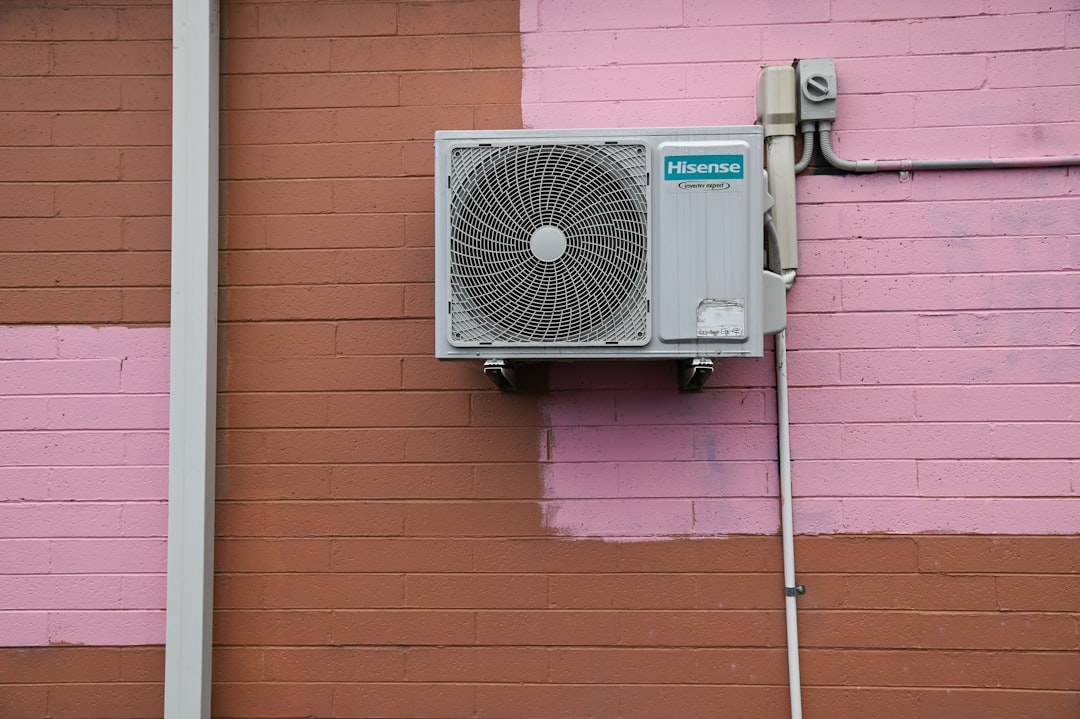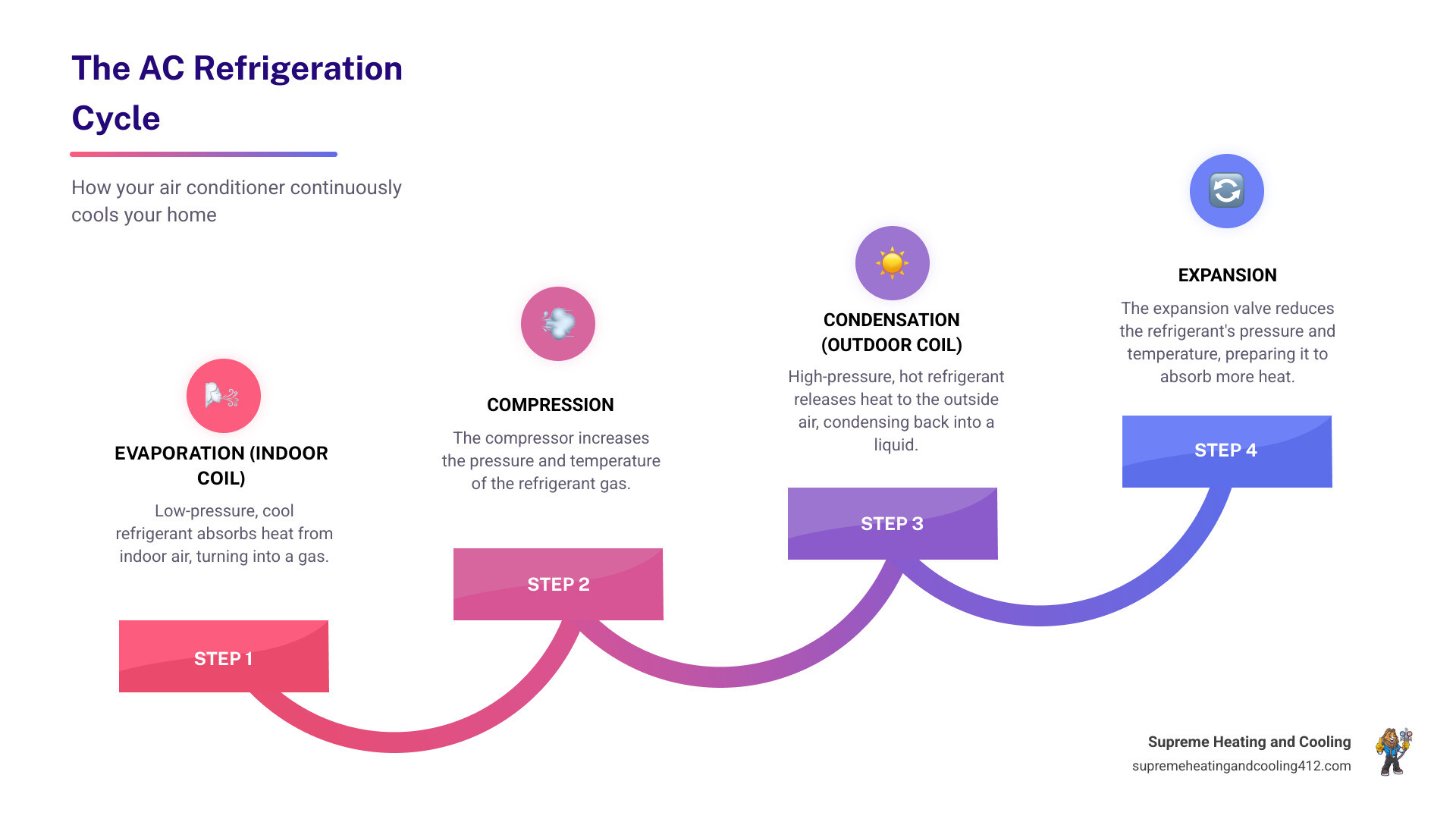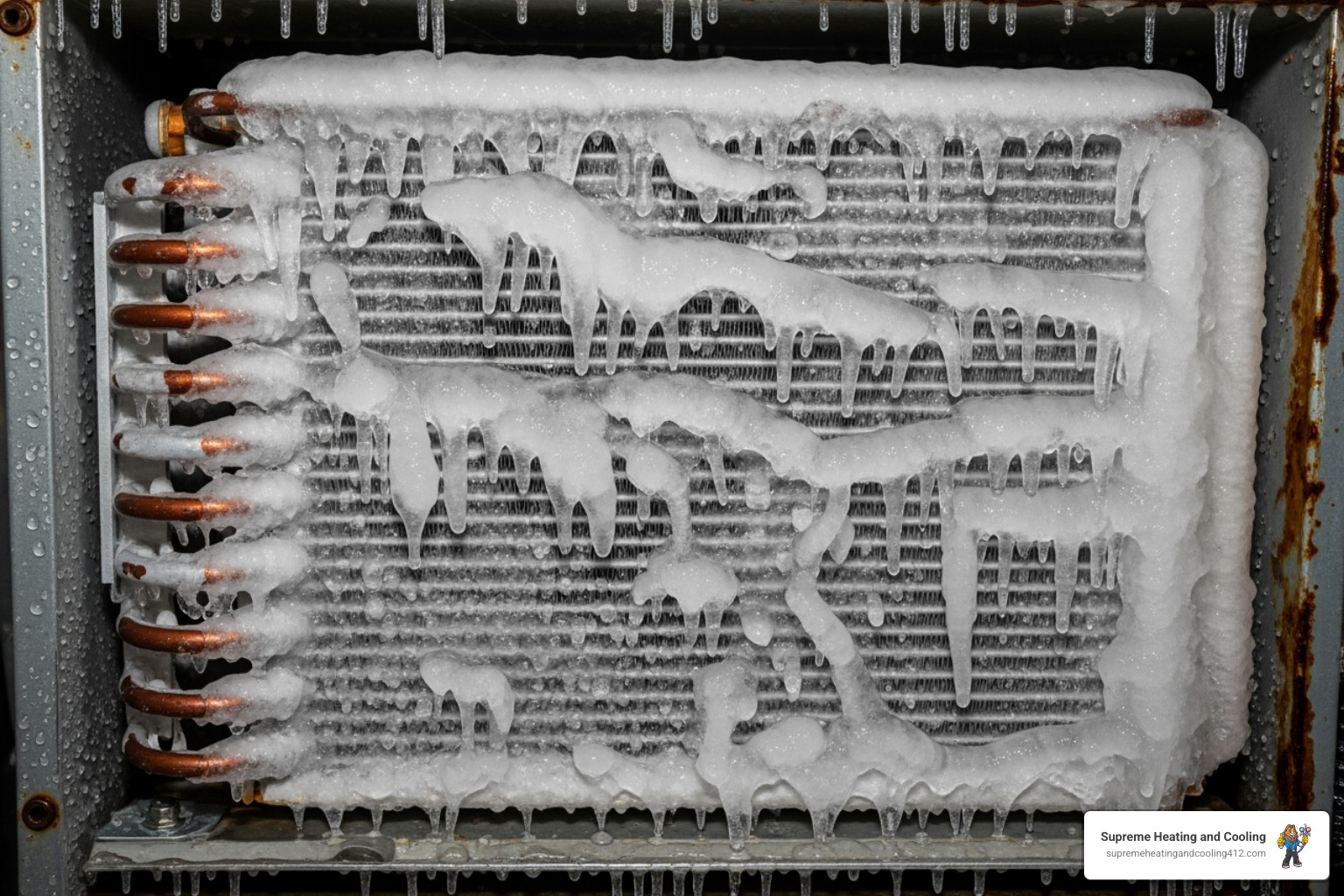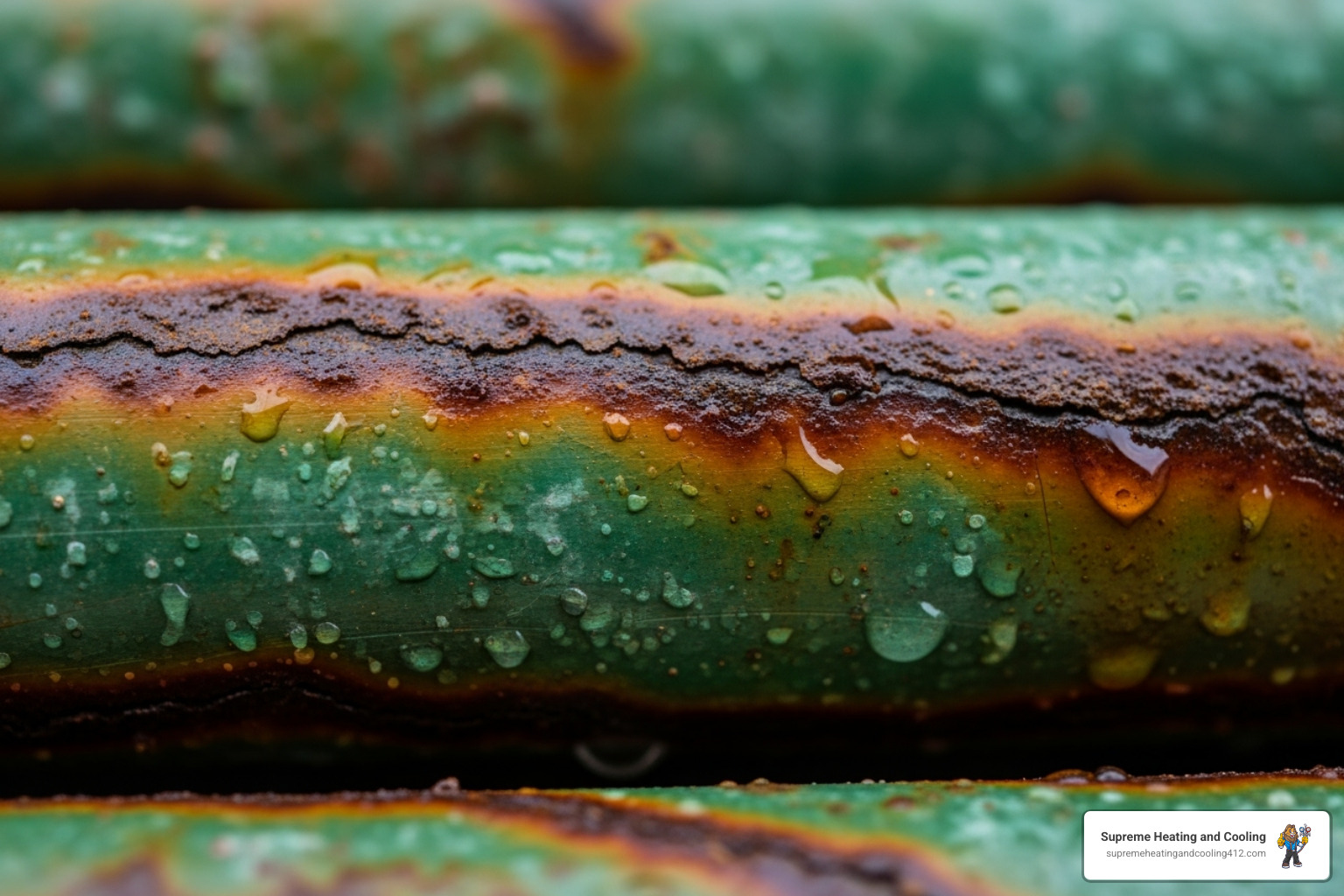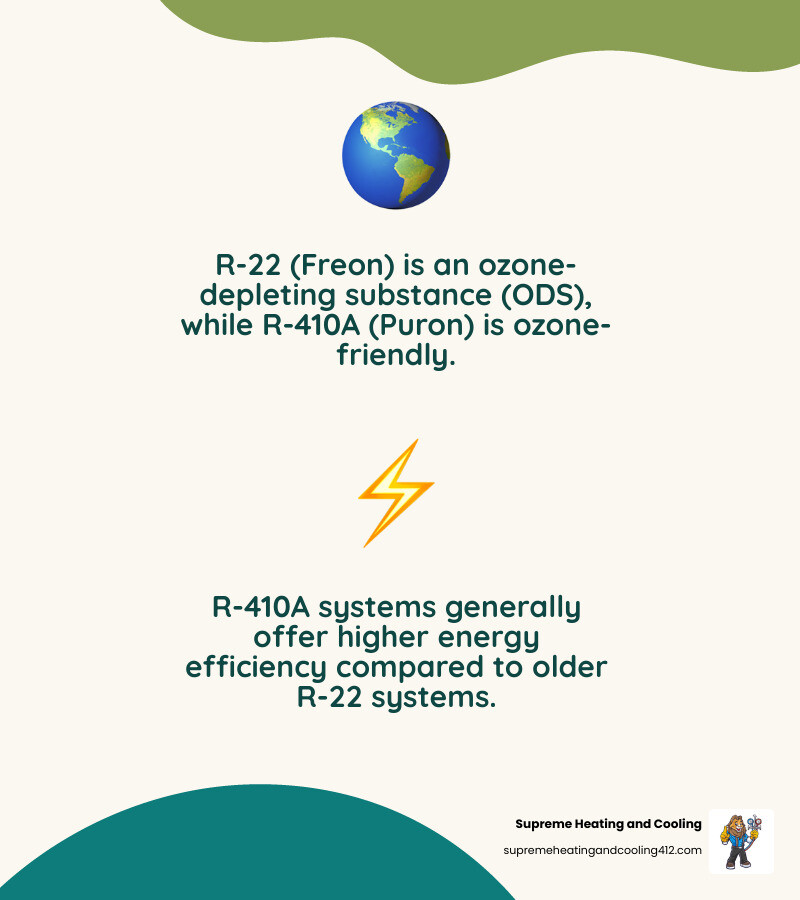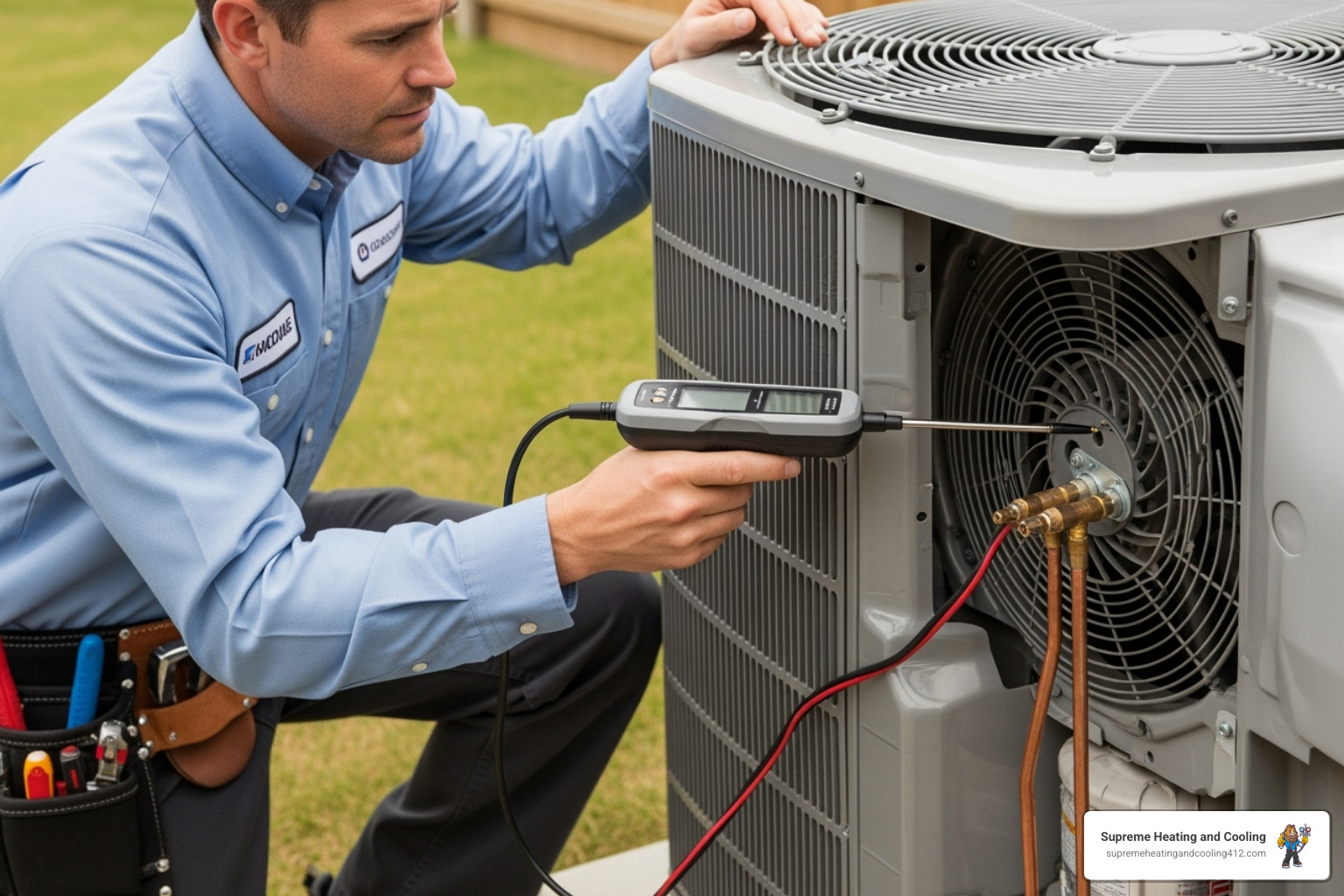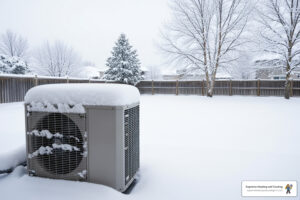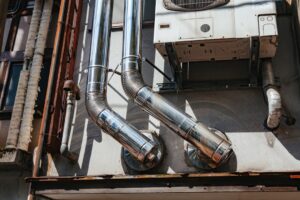The Myth of “Using Up” Freon
An AC freon leak is when refrigerant escapes from your air conditioning system through cracks, holes, or worn components, causing reduced cooling performance and potential health risks.
Quick Signs of an AC Freon Leak:
- Air from vents isn’t cold
- Home takes longer to cool down
- Ice buildup on copper lines or coils
- Hissing or bubbling sounds from the unit
- Higher than normal electric bills
- Increased indoor humidity
Here’s something most homeowners don’t know: your AC doesn’t “use up” refrigerant like a car uses gas. Refrigerant works in a closed-loop system, cycling between liquid and gas to absorb heat from your home and release it outside.
If your AC is low on refrigerant, there’s only one reason – it has a leak somewhere.
Many HVAC companies will offer to simply “top off” your system with more refrigerant. This might seem like a quick fix, but it’s actually wasteful and potentially illegal without finding and repairing the leak first. The refrigerant will just leak out again, leaving you with the same problem and an empty wallet.
Understanding the difference between a legitimate repair and a quick band-aid solution can save you hundreds of dollars and protect your family’s health and comfort.
The Telltale Signs of an AC Freon Leak
Something’s not right with your air conditioning, but you’re not sure what. Maybe the house just doesn’t feel as cool as it used to, or your energy bills have been creeping up. These could be early warning signs of an AC freon leak – and the sooner you spot them, the better.
Your AC system is pretty good at telling you when something’s wrong. You just need to know what to look for. The most obvious sign is warm air blowing from your vents. You walk over expecting that refreshing blast of cold air, but instead get something that feels more like a gentle breeze. When your AC is running but not actually cooling, a refrigerant leak is often the culprit.
But it’s not just about temperature. Your home might start feeling sticky and humid, even with the AC running. That’s because your system removes moisture from the air as it cools. When refrigerant levels drop, your AC loses its ability to dehumidify effectively, leaving you with that uncomfortable, clammy feeling that can even lead to mold problems.
Listen closely to your AC unit – both inside and outside. A hissing sound often means refrigerant is escaping through a crack or hole somewhere in the system. You might also hear bubbling sounds, which can indicate a leak that’s allowing air or moisture into the refrigerant lines. It’s subtle, but once you know what to listen for, it’s pretty unmistakable.
Your wallet will feel the impact too. When your AC is low on refrigerant, it has to work much harder to try to cool your home. This translates directly into higher energy bills – sometimes 10-20% higher than normal. Your system will also run longer cooling cycles, staying on almost constantly as it struggles to reach the temperature you’ve set.
One of the most surprising signs is ice buildup on your copper lines or evaporator coils. Many homeowners think this means their AC is working too well, but it’s actually the opposite – a sign that something’s seriously wrong with your system’s refrigerant levels.
Why Your AC Freezes Over
Here’s where things get a bit counterintuitive. When you have an AC freon leak, your system doesn’t just blow warm air – it can actually freeze up completely. It sounds backwards, but there’s solid science behind it.
Your evaporator coil needs a specific balance of pressure and temperature to work properly. When refrigerant levels drop due to a leak, the pressure in your system drops too. This causes the evaporator coil’s temperature to plummet below freezing – sometimes well below 32 degrees.
As moisture in your home’s air passes over this super-cold coil, it condenses and freezes into a thick layer of ice. This ice then blocks airflow, making the problem even worse and preventing the coil from absorbing heat from your home. It becomes a vicious cycle that can completely shut down your system.
While frozen coils can also happen due to dirty air filters or airflow problems, when you see ice combined with the other signs we’ve mentioned, it’s a strong indicator of a refrigerant leak. Research shows that low refrigerant impacts efficiency – even being off by just 10% can reduce your system’s efficiency by 10-20%.
What Causes an AC Freon Leak?
An AC freon leak doesn’t just appear overnight. There are usually specific reasons why your sealed system develops a breach, and understanding these can help prevent future problems.
The most common cause is simple wear and tear. AC systems age just like everything else, and components that were once flexible and strong can become brittle over time. Rubber seals and O-rings crack, and copper tubing can develop tiny pinhole leaks. If your system is over 15 years old, some level of aging is normal – though it doesn’t always lead to leaks.
Corrosion is trickier to spot but surprisingly common. Your indoor air contains more pollutants than you might think – formaldehyde from furniture, cleaning product residues, and other contaminants. When these mix with moisture on your evaporator coil, they can form corrosive acids that literally eat through copper tubing. This process, called formicary corrosion, creates microscopic holes that are incredibly difficult to find. Modern AC units with thinner copper tubing are especially vulnerable.
Sometimes the damage is more obvious. Physical damage to your outdoor unit can happen from lawnmowers, falling tree branches, hail storms, or even the occasional stray ball from neighborhood kids. Any impact that dents or punctures the coils can cause an immediate leak.
Your AC unit vibrates during normal operation, and over years of use, these vibrations can stress the joints, welds, and fittings in your refrigerant lines. Connections can loosen, and if copper lines rub against each other, they can eventually wear holes through the tubing.
Finally, improper installation can set you up for problems down the road. Poorly tightened connections, inadequate brazing, or incorrect refrigerant charging during installation can all lead to leaks later. This is why choosing an experienced, careful installer is so important from the start.
Health and Environmental Dangers of Leaking Refrigerant
When you find an AC freon leak, your first thought is probably about the cost of repairs and getting your home cool again. But here’s something that might surprise you: leaking refrigerant poses real dangers to both your family’s health and our environment that go far beyond a warm house.
Let’s be honest – refrigerants aren’t something you want floating around your living space. These chemicals are designed to stay safely contained within your AC system’s closed loop. When they escape, they can cause problems you definitely don’t want to deal with.
The Health Risks You Need to Know About
If you’re experiencing Freon poisoning symptoms, they can range from annoying to downright scary. Dizziness and nausea are often the first signs something’s wrong. You might also notice headaches that seem to come out of nowhere, along with confusion or trouble catching your breath.
Skin irritation can happen if liquid refrigerant makes direct contact with your skin – it’s cold enough to cause frostbite-like burns. Your eyes can get irritated too, especially if you’re spending time near the leaking unit.
Here’s where it gets more serious: children and pets are especially vulnerable because of their smaller size. In poorly ventilated areas, high concentrations of refrigerant can actually displace the oxygen in the air. We’re talking about symptoms like rapid heart rate, loss of coordination, and in extreme cases, even unconsciousness.
This isn’t meant to scare you, but it’s why we always tell our customers: if you suspect a leak, turn off your system and get some fresh air flowing through the area right away.
Why Refrigerant Leaks Hurt Our Planet
The environmental impact of refrigerant leaks is something we take seriously at Supreme Heating and Cooling. Older refrigerants like R-22 (the original Freon) are particularly harmful because they contribute to ozone depletion. That protective ozone layer shields us from dangerous UV radiation, so when it gets damaged, we all feel the effects.
That’s exactly why there was an R-22 phase-out. The EPA has strict regulations for refrigerants because they recognize how serious this issue is. As of 2020, R-22 production and import is completely banned in the United States.
Even newer refrigerants like R-410A, while ozone-friendly, are potent greenhouse gases. When they leak into the atmosphere, they contribute to global warming. This is why proper handling by EPA-certified technicians isn’t just a good idea – it’s the law.
Old vs. New: Understanding Refrigerant Types
If your AC system was installed before 2010, there’s a good chance it uses R-22 (Freon). Newer systems use R-410A (often called Puron). Understanding the difference can help you make better decisions when facing an AC freon leak.
| Feature | R-22 (Freon) | R-410A (Puron) |
|---|---|---|
| Chemical Type | Hydrochlorofluorocarbon (HCFC) | Hydrofluorocarbon (HFC) |
| Ozone Depletion | High (harmful to ozone layer) | Zero (ozone-friendly) |
| Energy Efficiency | Lower | Higher (often leads to more efficient systems) |
| Cost & Availability | Scarce and very expensive (phased out) | Readily available, more affordable |
| System Compatibility | Used in older AC units (pre-2010) | Requires specifically designed R-410A systems; cannot be used in R-22 systems |
| Pressure | Operates at lower pressures | Operates at higher pressures (requires stronger components) |
Here’s the reality: R-22 is becoming incredibly expensive and hard to find. We’ve seen the price skyrocket as supplies dwindle. Meanwhile, R-410A systems are more energy efficient and better for the environment.
The catch? You can’t just swap one refrigerant for the other. R-410A operates at much higher pressures, so it needs specially designed components. If you have an older R-22 system with a significant leak, replacement often makes more financial and environmental sense than repair.
What to Do When You Suspect a Leak
Finding you might have an AC freon leak can feel overwhelming, but taking the right steps immediately will protect your family’s safety and prevent costly damage to your air conditioning system.
Safety First: Your Immediate Actions
When you suspect an AC freon leak, your safety comes first. While refrigerant itself doesn’t have a strong odor, the health symptoms we discussed earlier – like dizziness, headaches, or nausea – are your body’s warning signals.
Turn off your system immediately. Head to your thermostat and switch your AC to “off.” This simple step prevents your unit from running with dangerously low refrigerant levels, which can destroy your compressor – the heart of your AC system and its most expensive component.
Ventilate the area right away. Open windows and doors throughout your home to get fresh air circulating, especially near your indoor unit or furnace. Turn on bathroom and kitchen exhaust fans if you have them. This helps clear out any leaked refrigerant and reduces your family’s exposure.
If anyone in your household is experiencing severe symptoms like difficulty breathing, persistent dizziness, or if there’s a strong chemical smell, evacuate immediately and seek medical attention. Don’t take chances with your family’s health.
Contact a professional HVAC technician – and this is crucial – don’t try to fix the leak yourself or add more refrigerant. Handling refrigerants requires specialized EPA certification, proper tools, and years of training. Plus, simply adding more refrigerant without fixing the actual leak is like putting a band-aid on a broken pipe – wasteful, expensive, and environmentally harmful.
Once you’ve taken these safety steps, it’s time to call in experts who can properly diagnose and repair your system.
How Professionals Find and Fix Leaks
When you call us about a suspected AC freon leak, our experienced technicians arrive equipped with specialized tools designed to pinpoint even the tiniest leaks. Finding refrigerant leaks isn’t like spotting a water puddle – refrigerant escapes as an invisible gas, making detection a job for professionals.
Electronic leak detectors are our go-to tool for most situations. These sensitive handheld devices can “smell” even trace amounts of escaping refrigerant. Our technicians methodically scan along refrigerant lines, coils, and connections, listening for the telltale alarm that signals a leak.
For visible areas, we often use the tried-and-true bubble test. By applying soapy water to suspected leak points – joints, valves, or coil connections – we can watch for bubbles forming, just like checking for a leak in a bicycle tire. It’s simple but incredibly effective for accessible areas.
Ultraviolet dye testing is particularly useful for those sneaky, hard-to-find leaks. We inject a special fluorescent dye into your refrigerant system, let it circulate, then use UV lights to scan the entire system. The dye glows brightly at leak sites, revealing even microscopic holes that would otherwise be impossible to spot.
For complex cases, we might perform a nitrogen test. After evacuating the refrigerant, we pressurize the system with nitrogen and monitor for pressure drops over time, which indicate leaks somewhere in the system.
Once we’ve located the leak, the repair method depends on its size and location. Small cracks in copper lines can often be repaired through brazing – a process where we heat the metal and use filler material to create a strong, permanent seal. Loose connections might simply need proper tightening and resealing.
However, extensive leaks or damage to major components like evaporator coils, condenser coils, or refrigerant lines typically require replacing the entire damaged part. Sometimes the issue is as straightforward as a faulty Schrader valve (the service port where refrigerant is added), which can be replaced relatively easily.
Our goal is always to provide a lasting repair, not a temporary fix that will leave you dealing with the same problem months down the road.
Repair or Replace: Making the Right Call for an AC Freon Leak
After diagnosing your AC freon leak, you’ll face an important decision: should you repair your existing system or replace it entirely? This choice depends on several key factors, and we’re here to help you make the best decision for your home and budget.
Your unit’s age plays a huge role in this decision. If your AC system is over 15 years old, it’s entering the final stretch of its typical 15-20 year lifespan. Investing heavily in repairs for an aging system often means you’re just postponing the inevitable, especially since other components are likely to fail soon.
The repair cost versus replacement cost is another critical factor. We follow what’s known as the “50% rule” – if repair costs exceed half of what a new system would cost, replacement usually makes more financial sense. For instance, replacing a major component like an evaporator coil can be expensive, and that money might be better invested toward a new, more efficient system.
If your system uses R-22 (Freon), replacement becomes even more attractive. Since R-22 production ended in 2020, it’s become incredibly scarce and expensive. You’d be paying premium prices for an outdated refrigerant that will only become harder to find and more costly over time.
Long-term savings with a new system often outweigh the higher upfront cost. Modern AC units using R-410A are significantly more energy-efficient than older models, which translates to lower monthly utility bills for years to come. Plus, new systems come with comprehensive warranties, giving you peace of mind and protection against unexpected repair costs.
There’s also the comfort and reliability factor to consider. Replacing an old, unreliable system means consistent, efficient cooling and the confidence that you won’t be sweating through the next heat wave due to another unexpected breakdown.
We believe in giving you honest, straightforward advice without any high-pressure sales tactics. Our technicians will thoroughly assess your specific situation, explain all your options clearly, and help you understand the pros and cons of both repairing and replacing your system. The decision is always yours to make.
Frequently Asked Questions about AC Leaks
When homeowners call us about their cooling problems, we hear the same questions over and over again. And honestly, we love these conversations! It means you’re thinking critically about your system and want to understand what’s really going on. Let’s tackle the most common questions we get about AC freon leaks.
What does an AC freon leak smell like?
Here’s something that surprises almost everyone: Freon itself has no smell at all. Zero. Nada. So if you’re walking around your house trying to “sniff out” a refrigerant leak, you might be barking up the wrong tree.
Now, here’s where it gets a little tricky. Sometimes you might notice a faint sweetish smell or something that reminds you of chloroform or nail polish remover. But that’s not actually the refrigerant you’re smelling – it’s the mineral oil that circulates with the refrigerant and can leak out along with it.
The bottom line? Don’t rely on your nose to detect an AC freon leak. It’s just not a reliable indicator. Instead, trust those other warning signs we talked about earlier – like your home not cooling properly, ice buildup on your coils, or those telltale hissing sounds.
Can I just add more Freon to my AC?
This is probably the question that makes us sigh the most, because we know some companies out there will happily take your money to “top off” your system. But here’s the truth: absolutely not.
Your air conditioning system is what we call a closed-loop system. Think of it like a sealed water balloon – nothing should be getting in or out. Refrigerant doesn’t get “used up” like gasoline in your car or propane in your grill. It just keeps cycling around and around, doing its job year after year.
If your AC is low on refrigerant, there’s only one explanation: it has a leak somewhere. Adding more refrigerant without fixing that leak is like filling up a bucket with a hole in the bottom. You’re just throwing money away, and that expensive refrigerant is going to escape right back into the atmosphere.
Even worse, it’s actually illegal for anyone without EPA certification to add refrigerant to your system. And certified technicians? They’re legally required to find and fix the leak before adding any refrigerant back. It’s not just about following rules – it’s about doing the right thing for your wallet and our environment.
How can I prevent refrigerant leaks?
Nobody wants to deal with an AC freon leak, so let’s talk about how you can stack the odds in your favor. While some things are just out of your control (like your system getting older), there are definitely steps you can take to keep your AC healthy.
Regular maintenance is your best friend here. We can’t stress this enough! When our technicians come out for your annual tune-up, we’re not just changing filters and calling it a day. We’re inspecting every connection, checking refrigerant levels, and looking for early warning signs of trouble. Catching a tiny issue during a routine visit is so much better than finding a major leak on the hottest day of summer.
Professional installation matters more than you might think. Many of the leaks we see could have been prevented with proper installation from the start. Poorly brazed joints, loose connections, or incorrect refrigerant charging during installation can all lead to problems down the road. This is why choosing a reputable company (like us!) that takes pride in quality workmanship really pays off.
Keeping your coils clean is another simple but important step. Dirty coils don’t just make your system work harder – they can actually lead to corrosive buildup that eats away at your copper tubing over time. A gentle rinse of your outdoor unit and professional cleaning of your indoor coils during maintenance goes a long way.
Finally, protect that outdoor unit! It’s sitting outside, exposed to everything Mother Nature and your neighborhood can throw at it. Be careful when you’re mowing around it, keep plants trimmed back so air can flow freely, and maybe consider a protective fence if you’ve got kids who like to play ball in the yard.
Taking these steps won’t guarantee you’ll never have a refrigerant leak, but they’ll definitely help your system live a longer, healthier life. And trust us – your future self will thank you when you’re staying cool and comfortable while your neighbors are dealing with AC emergencies.
Your Trusted Partner for AC Repair
When you’re dealing with an AC freon leak, you’re not just facing a simple maintenance issue – you’re dealing with something that affects your family’s comfort, your monthly budget, your health, and even the environment around us. It’s the kind of problem that demands real expertise, not a quick fix or a Band-Aid solution.
We’ve seen too many homeowners get burned by companies that want to just “top off” their refrigerant and send them a bill. That approach doesn’t solve anything – it’s like putting a bucket under a leaky roof and calling it fixed. The refrigerant will leak out again, you’ll be uncomfortable again, and you’ll be out even more money.
At Supreme Heating and Cooling, we believe you deserve better than that. Our team consists of professional, knowledgeable, and friendly technicians who specialize in the installation, maintenance, and repair of heating and AC systems. When we diagnose an AC freon leak, we take the time to find the actual source of the problem and explain your options clearly.
We pride ourselves on our trustworthy, non-pushy service approach. That means we’ll never pressure you into a repair or replacement you don’t need. Instead, we’ll give you the honest facts about what’s wrong, what it will take to fix it properly, and help you make the decision that’s right for your home and your budget.
Our competitive pricing means you won’t pay more than you should, and our personable team ensures you feel confident and comfortable with every step of the process. We know AC problems are stressful – the last thing you need is a technician who talks down to you or makes you feel like you’re being taken advantage of.
Don’t let an AC freon leak leave you sweating through another hot day. We’re here to get your home cool and comfortable again, the right way.
Schedule your AC repair in Sewickley, PA today

